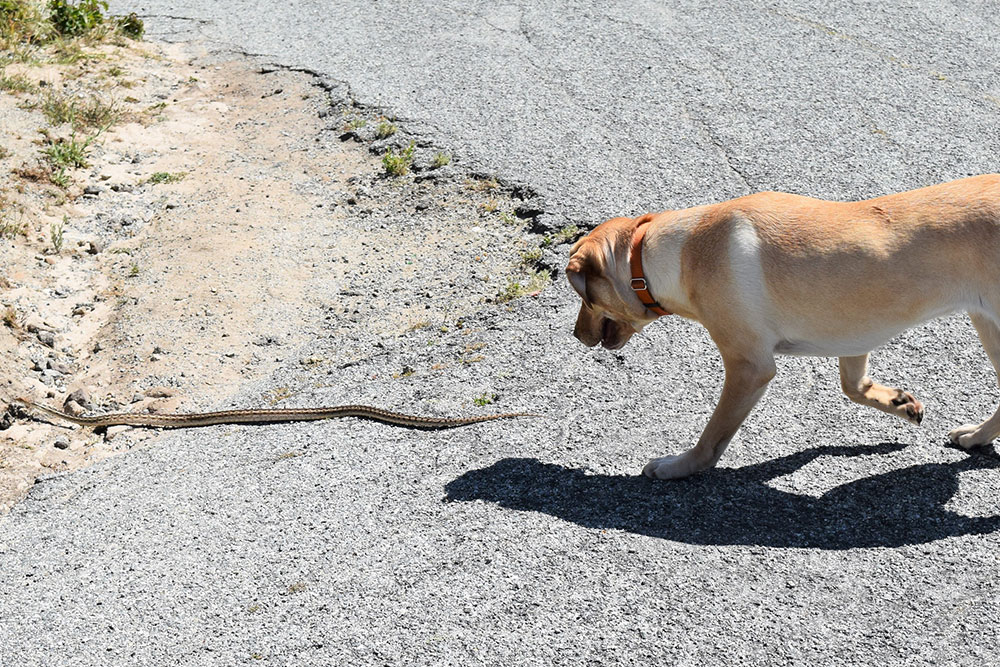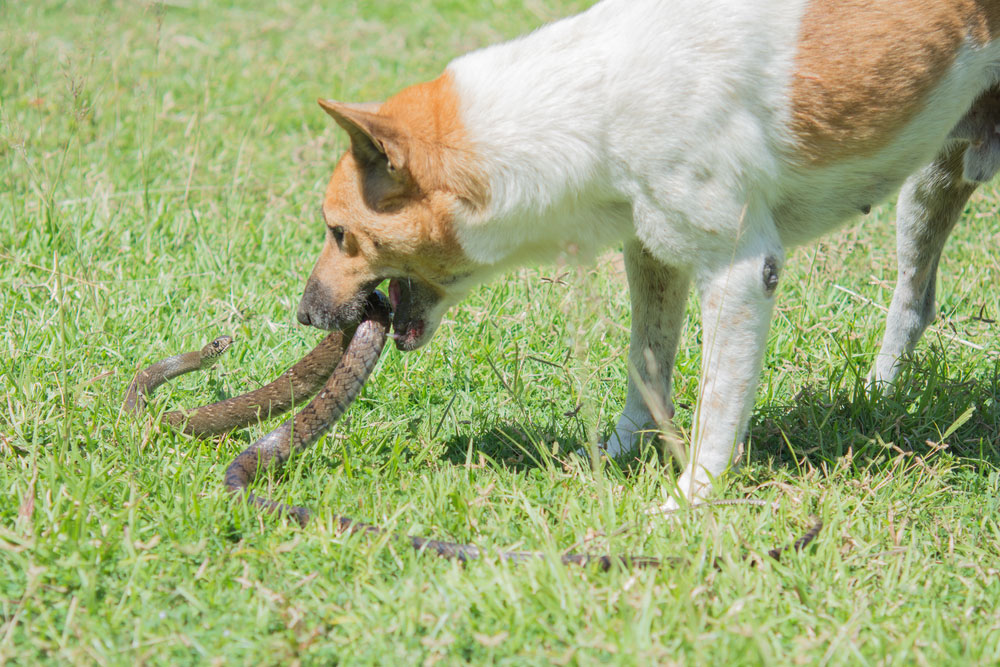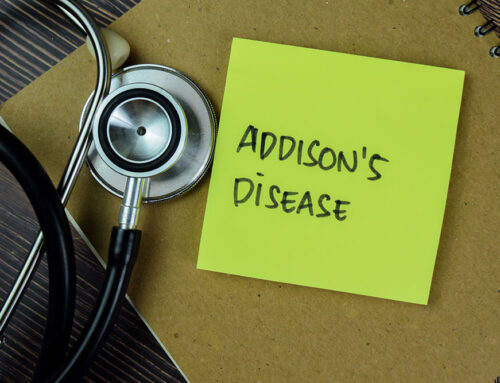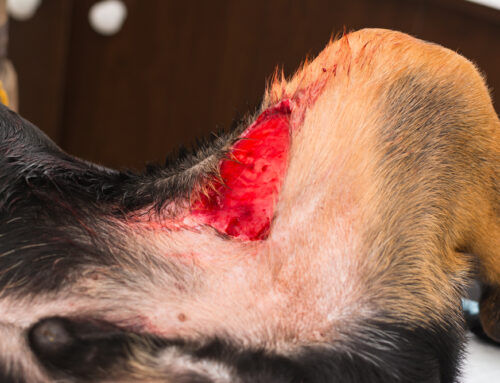Snake Bites in Pets: Emergency Care and What to Do Next
You’re out enjoying a walk with your dog on a warm Idaho afternoon when suddenly, they yelp and pull up their paw. A closer look reveals two tiny puncture marks—and just like that, your relaxing outing turns into a medical emergency. At Alpine Animal Hospital in Pocatello, we understand how overwhelming a snake bite situation can be. In a moment like that, knowing what to do next matters. Do you know what to do?
Understanding Snake Bites in Pets
Snake bites occur when a snake’s fangs pierce the skin, often injecting venom. While not every bite is venomous, all bites require immediate attention. In Idaho, rattlesnakes pose the greatest risk, especially during warmer months when they’re more active, as rattlesnakes become more active as weather warms.
Time is critical. Snake venom can spread rapidly, damaging tissue, nerves, and vital organs. Even non-venomous bites may lead to infection or complications. Acting quickly can mean the difference between a full recovery and lasting harm.
Why Venomous Bites Are So Dangerous
Venom can vary by snake species and bite severity. Here’s how it affects pets:
- Hemotoxic venom: Disrupts clotting, causing bruising, internal bleeding, or anemia.
- Neurotoxic venom: Impairs nerve function, leading to tremors, weakness, or paralysis.
- Cytotoxic venom: Destroys tissue, producing severe swelling and potentially necrosis.
Factors influencing severity include snake size, bite location, and your pet’s size and health. In addition to venom effects, infection, allergic reactions, and complications may arise.
Recognizing Snake Bite Symptoms
Immediate Symptoms
- Rapid swelling near the puncture site
- Visible fang marks—two small puncture wounds
- Bleeding or bruising due to hemotoxic effects
Systemic Symptoms
As venom circulates, you may notice:
- Lethargy or collapse
- Muscle tremors or generalized weakness
- Excess salivation or drooling
- Respiratory distress or shallow breathing
- Pale or blue gums
- Irregular heartbeat or arrhythmias
Without treatment, venom continues to cause severe tissue damage and potential organ failure.
How We Diagnose a Snake Bite
From the moment your pet arrives, our team shifts into high gear:
- First, we stabilize—oxygen if breathing is labored; IV fluids to support circulation
- We perform a full physical exam and closely inspect the bite site
- Rapid diagnostics:
- Blood tests check clotting ability, kidney and liver health
- Urinalysis screens for internal organ damage
- Venom assays, when available, help determine the right antivenom
These early steps set the stage for the most effective treatment.
Treatment Options: What to Expect
Antivenom
When a pet is envenomated, antivenom is the cornerstone of care. This medicine binds and neutralizes venom components, reducing spread and tissue damage. We stock antivenom specifically for Idaho pit vipers, similar to rattlesnake venom. During administration, we monitor closely for allergic or anaphylactic reactions, which—though rare—require immediate attention.
Supportive Care
Along with antivenom, treatment typically includes:
- IV fluids to support circulation and kidney function
- Pain relief with appropriate medications
- Oxygen therapy for respiratory distress
- Antibiotics to prevent or treat infection
- Blood transfusions if bleeding or anemia is severe
- Wound care to monitor necrosis or infection
Recovery and Rehabilitation
Pets recover at different rates depending on bite severity. Ongoing care may include:
- Restricted activity for tissue healing
- Follow-up monitoring via blood tests for organ function
- Laser therapy or acupuncture as needed for pain and swelling
How Snake Bites Affect Daily Life
Recovery may affect your routine:
- Confinement and rest may continue for weeks
- Soft bedding aids comfort and healing
- Feeding adjustments if swelling affects eating
- Stress management—pets may become anxious after traumatic events
We work closely with you to support your pet’s emotional as well as physical recovery.
Prevention: Keeping Your Pet Safe
Reducing snake encounters is key:
- Always use a leash on walks in snake habitat
- Clear debris and tall grass where snakes hide
- Avoid walking during active periods (dawn/dusk and warm months)
- Consider Snake Avoidance Training, which teaches dogs to recognize and steer clear of snakes
- Discuss the rattlesnake vaccine as a precaution—it’s not a substitute for antivenom but may lessen reaction severity Learn more: Rattlesnake Vaccine for Dogs – MetLife Pet Insurance
Learn more: How to Avoid Getting Bitten by a Rattlesnake
What to Do Immediately If Your Pet Is Bitten
- Stay calm and keep your pet quiet to slow venom spread
- Avoid applying ice or tourniquets—these can worsen injury
- Note the time and location of the bite
- Transport your pet to the vet immediately—call ahead to alert staff
What to Bring to Your Appointment
Helpful items include:
- Bite time and location details
- Photos of the snake, if safe
- Your pet’s medical history and medications
- Photos or videos of symptoms
- Emergency questions about treatment, vaccination options, and aftercare
DO NOT attempt to catch the snake or bring the snake to the ER with your pet.

FAQs
How dangerous is a rattlesnake bite for my pet?
Rattlesnake bites can be life-threatening, but with prompt care and antivenom, many pets recover fully.
Is antivenom always necessary?
In venomous bites, antivenom reduces recovery time and damage—it’s often essential.
What about the rattlesnake vaccine?
The rattlesnake vaccine may reduce severity, but should never replace emergency treatment and antivenom.
Do snake bites only occur in rural areas?
No—venomous snakes can be found in suburbs and city outskirts.
Your Partner in Emergency Care
Snake bites are frightening, but you’re not alone. At Alpine Animal Hospital, we’re equipped to handle bites swiftly and compassionately. Contact us immediately if your pet appears to have been bitten. We’re here to act fast, treat fully, and support you through the recovery process with care and confidence.







Leave A Comment